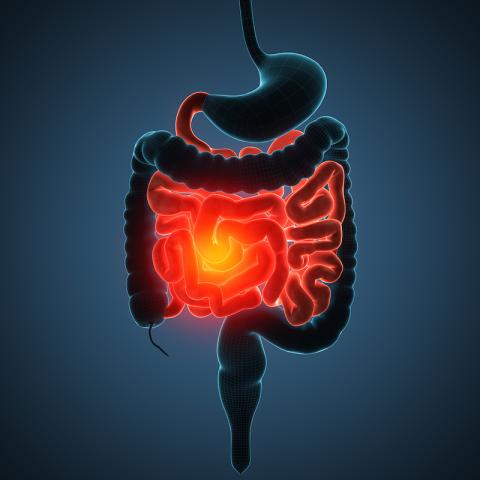
A team led by researchers at Imperial College London have demonstrated a link between the microbes present in the gut and the strength of antibody response to the COVID-19 vaccines in people on certain treatments for inflammatory bowel disease.
Previous research has shown that people with inflammatory bowel disease (IBD) being treated with anti-TNF therapy are less likely to mount a strong immune response to COVID-19 vaccines. Anti-TNF therapy reduces inflammation and is used worldwide to treat inflammatory conditions such as rheumatoid arthritis, psoriasis, inflammatory bowel disease and ankylosing spondylitis.
The gut microbiota is the name given to the vast collection of microorganisms that reside in our gut, and which are known to have a profound effect on our health. The microbiota is known to play an important role in shaping immune responses. It is often adversely affected by Inflammatory Bowel Disease (IBD). The metabolome is the full range of small-molecule chemicals present in an individual’s system.
This new study, published in the journal EBioMedicine and undertaken as part of the CLARITY IBD study, explored whether the gut microbiota and metabolome could explain variations in COVID-19 vaccination responses in people with IBD being treated with a drug that suppresses the immune system.
The researchers took faecal and serum samples from 43 people treated with infliximab for IBD. They measured antibody responses following two doses of either the AstraZeneca or Pfizer vaccine.
Seventeen patients (39.5%) had levels of antibodies that were classified as being lower than average. The diversity of gut microbiota in these individuals was found to be lower.
Two particular types of bacteria were singled out as having a clear association with antibody levels. An abundance of bilophila was associated with a better antibody response to vaccination, while streptococcus was associated with a poorer response.
The faecal metabolome was also found to have an association with different antibody responses. In particular, organic compounds trimethylamine and isobutyrate, as well as omega-muricholic acid, were associated with a better response, while succinate, phenylalanine, taurolithocholate and taurodeoxycholate were associated with a poorer response.
The researchers concluded that there is an association between the gut microbiota and differences in antibody response to COVID-19 vaccination in people being treated with anti-TNF therapy for IBD. This is the first study to demonstrate a link between the metabolic function of the gut microbiota and immune responses to COVID-19 vaccination in a vulnerable group.
